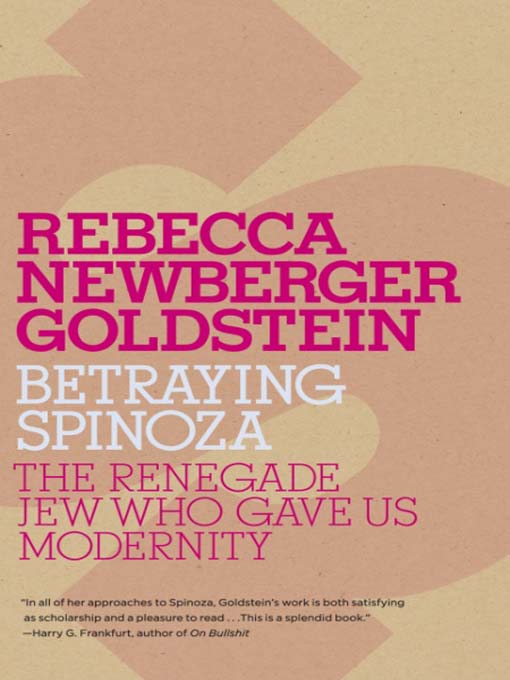In 1656, Amsterdam’s Jewish community excommunicated Baruch Spinoza, and, at the age of twenty–three, he became the most famous heretic in Judaism. He was already germinating a secularist challenge to religion that would be as radical as it was original. He went on to produce one of the most ambitious systems in the history of Western philosophy, so ahead of its time that scientists today, from string theorists to neurobiologists, count themselves among Spinoza’s progeny.
In Betraying Spinoza, Rebecca Goldstein sets out to rediscover the flesh-and-blood man often hidden beneath the veneer of rigorous rationality, and to crack the mystery of the breach between the philosopher and his Jewish past. Goldstein argues that the trauma of the Inquisition’ s persecution of its forced Jewish converts plays itself out in Spinoza’s philosophy. The excommunicated Spinoza, no less than his excommunicators, was responding to Europe’ s first experiment with racial anti-Semitism.
Here is a Spinoza both hauntingly emblematic and deeply human, both heretic and hero—a surprisingly contemporary figure ripe for our own uncertain age.
-
Creators
-
Series
-
Publisher
-
Release date
August 11, 2009 -
Formats
-
Kindle Book
-
OverDrive Read
- ISBN: 9780805242737
-
EPUB ebook
- ISBN: 9780805242737
- File size: 2715 KB
-
-
Languages
- English
-
Reviews
-
Publisher's Weekly
March 20, 2006
This biography of 17th-century philosopher Baruch Spinoza (1632–1677) may seem out of place in the Jewish Encounters series, devoted to Jewish thinkers and themes, because Spinoza denied the importance of Jewish identity, and Amsterdam's Jewish community expelled him for heresy. But Goldstein, author of The Mind-Body Problem
and Incompleteness
and a professor of philosophy, reconstructs Spinoza's life and traces his metaphysics to his efforts to solve the dilemmas of Jewish identity. The philosopher grew up in a community of Jews who had fled the Spanish-Portuguese Inquisition. As Goldstein argues, Spinoza's "determination to think through his community's tragedy in the most universal terms possible compelled him to devise a unique life for himself, insisting on secularism when the concept of it had not yet been conceived." For Spinoza, "salvation" lay in achieving the radical objectivity of pure reason, which dissolves the contingent facts of one's personal history and religious and ethnic identity. Spinoza's effort to live as neither Jew nor Christian nor Muslim was unthinkable in the 17th century, but his arguments for political and religious tolerance were forerunners for the U.S. Constitution. In this admirable biography, Goldstein shows that Spinoza is paradoxically Jewish, "or what can be more characteristic of a Jewish thinker than to use the Jewish experience as a conduit to universality?"
-
Formats
- Kindle Book
- OverDrive Read
- EPUB ebook
subjects
Languages
- English
Loading
Why is availability limited?
×Availability can change throughout the month based on the library's budget. You can still place a hold on the title, and your hold will be automatically filled as soon as the title is available again.
The Kindle Book format for this title is not supported on:
×Read-along ebook
×The OverDrive Read format of this ebook has professional narration that plays while you read in your browser. Learn more here.

